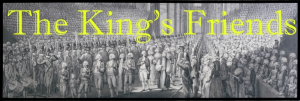
Thanks for your interest in the King’s Friends. We are not at the moment able to process new requests to join the King’s Friends. And following the sad passing of Professor Arthur Burns, there are areas of the King’s Friends that need to be revised. Therefore, while we undertake the work, we have temporarily removed the sign up. Please do check back in the future.
